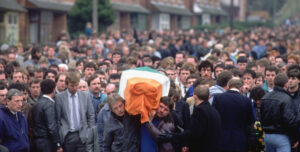Freddie Scappaticci died sometime last week, somewhere in his late 70s, somewhere in England. It is a death that defies obituary.
Obituaries give shape to a death and hold it in context, allowing us to extract explanations and lessons. But Scappaticci died distant from his victims, accusers, collaborators, investigators — geographically and chronologically removed from Northern Ireland, the Troubles and his role in them. He died far out of context, which was perhaps fitting for a spy.
Scappaticci had made an art of elusiveness. I searched for him 18 years ago, when he became known by the code name given to him by Britain’s security services: Stakeknife. As their agent, he had risen within the IRA to head its own internal security unit, the Nutting Squad, famous for shooting its subjects in the back of the “nut”, or head. Scappaticci stood accused of killing and torturing many people while also, his handlers claimed, saving untold other lives. Sir John Wilsey, the top British general in Northern Ireland during much of the conflict, called Scappaticci the army’s “golden egg”.
Along the way I found others close to him. A bomb maker. An intelligence officer. In 2005, in Belfast, I met Denis Donaldson, a longtime IRA recruiter and then Sinn Féin party leader. He sat at his kitchen table next to his wife and smoked, often glancing towards a set of security monitors. Just outside the kitchen, a wrought-iron gate blocked access to stairs leading up to his home’s second floor. Donaldson was a careful man who had survived hunger strikes and imprisonment at Long Kesh and cross-border IRA missions. Even so, the Stakeknife revelations shook him. “I still can’t believe it,” he said. “My God.”
In the meantime, Scappaticci — Scap, to his IRA friends — had disappeared from the landscape of County Antrim only to reportedly reappear, vaguely, somewhere in Italy. Then back in Northern Ireland, somehow. Then maybe a coastal village in Scotland. In retrospect, he had better instincts for survival than some of his cohort; early one morning, I received a call from a source who said: “Yer man Denis Donaldson has just been expelled from Sinn Féin, about three minutes ago — for being a British spy.” A few months later, my source called again, to say Donaldson had been found in County Donegal, in a remote cottage without electricity or running water. He’d been shot to death. “Missing a hand,” he said.
So, when I heard Stakeknife had died on Tuesday, I wondered at first who had finally found him. It seems time itself had.
Scappaticci grew up in Belfast’s Markets area in the Fifties, the son of an Italian immigrant who sold ice cream from a van. He had the funny name, with its plosive foreign consonants, but he lived like any other Belfast boy — playing football for fun, then laying bricks for money — until the Troubles began. In 1971, police picked him up for rioting and interned him at Long Kesh alongside Gerry Adams, the future Sinn Féin president; Scappaticci became his bodyguard. The short, broad-chested young man was, like all of Northern Ireland, reborn as something new.
The IRA was hard on its foot soldiers and, the story goes, in 1978 one of Scappaticci’s senior officers beat him as punishment for some organisational infraction. Afterwards, outraged, he marched into a British army office and offered his services as a spy. The impulse was small but pivotal for the entire conflict; with the help of his handlers, Scappaticci climbed into the untouchable role of the IRA’s head spy-hunter. From that vantage he interrogated and allegedly killed informers or “touts”, some of whom were his own unwitting British security counterparts. Investigators say he is “linked” to at least 18 deaths, and may have played a role in many more.
That violence — that intensity of violence, at least — came to an end 25 years ago this week, with the Good Friday Agreement. The peace has held, defying gravity all these years. The “peace walls” still divide Protestant and Catholic neighbourhoods, and social housing is still almost entirely segregated, but the churn of blood and flesh has stopped.
The price is weak government. The Good Friday Agreement is a power-sharing arrangement with parity and fragility built in; if either side walks away, the government falls apart. That has happened half a dozen times since the Agreement began, and it’s happening now. Today, people in Northern Ireland can expect a handful of the barest public services, but there’s no leadership in power, no direction. The Northern Irish are, in many ways, adrift.
A generation of people have grown up under the Good Friday Agreement, knowing only peace. Some of them — a frustrated splinter — feel a nostalgia for a conflict they can’t remember. So they romanticise past violence. Now, on the Republican side, the New IRA gathers young people to itself, and lashes out in old ways. In February, its gunmen attempted to kill policeman John Caldwell in Omagh, shooting him multiple times as he finished coaching a youth football practice, scattering children and leaving Caldwell almost dead. In March, MI5 raised the threat of terrorism from “substantial” to “severe”, indicating an attack is highly likely. And this week police foiled a New IRA bomb plot in Derry, set to coincide with Joe Biden’s brief visit.
There is frustration on the opposite side, too. The feeling of adriftness has deepened in recent years as Brexit has forced the government to draw a customs border on one side or the other of Northern Ireland, implicitly asking whether it is more Irish or British. The Sunak administration has placed the border in the Irish Sea and Westminster has assented, alienating Unionists on the outlying side of that border. They view it as a government capitulation to the threat of Republican violence.
Most young people, though, simply want something resembling the life Freddie Scappaticci knew before the Troubles began: playing sports, finding productive work. They go to concerts, buy homes, start families. And they yearn for something they have never known: a functioning government. The power-sharing structure of the Good Friday Agreement dictates, absurdly, that votes from third-party representation in the Northern Ireland Assembly don’t count. Despite this, the third-largest, fastest-growing party now is the centrist Alliance Party. The Protestant and Catholic wings have shrunk so that neither holds a majority, and it’s not difficult to imagine a day when a plurality of Northern Irish voices go unheard, while outnumbered partisans bicker over control.
The peace exacts one other price, in the form of accountability. Various inquiries and reports have investigated the worst atrocities of the Troubles, and one, Operation Kenova, is dedicated entirely to the work of Stakeknife. It has employed 50 investigators and cost more than £30 million, but has not yet issued its report. On the news of Scappaticci’s death, Kenova’s head investigator, Jon Boutcher, told the BBC that “old age may catch up with those affected, be they perpetrators, witnesses, victims, family members or those who simply lived through those times, before matters are concluded”.
That’s more revealing than intended. As we search for the meaning in Scappaticci’s death, it seems he has made one last escape. It may upset us that he and his controllers have eluded justice, but there lies the truth of Northern Ireland’s future. Most of us who did not grow up within the Troubles remain unable to grasp the fullness of the conflict. It’s too complex. It unfurls and loops back to touch itself, an endless fractal of loyalties and recriminations: thousands of deaths, tens of thousands of lives destroyed, and countless ugly street encounters and dinner-table spats.
Instead, this one death — this informer, this spy — seems more graspable. So we reach for explanation, for understanding, for warning. But the lessons of Freddie Scappaticci’s death, even placed in its context, are ultimately as unsearchable as the man himself. Scappaticci, for his part, denied ever spying in the first place. His death offers no solutions to or illumination of the chaos in which he lived and acted, and no hope for Northern Ireland. Those answers, like Stakeknife, remain elusive.
Disclaimer
Some of the posts we share are controversial and we do not necessarily agree with them in the whole extend. Sometimes we agree with the content or part of it but we do not agree with the narration or language. Nevertheless we find them somehow interesting, valuable and/or informative or we share them, because we strongly believe in freedom of speech, free press and journalism. We strongly encourage you to have a critical approach to all the content, do your own research and analysis to build your own opinion.
We would be glad to have your feedback.
Source: UnHerd Read the original article here: https://unherd.com/



